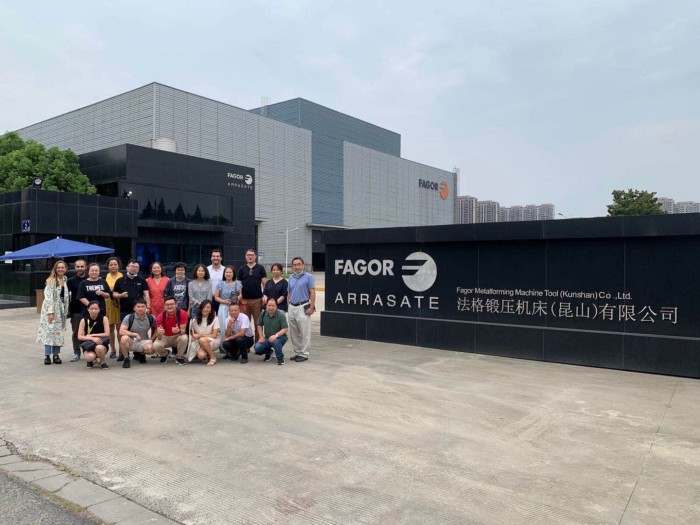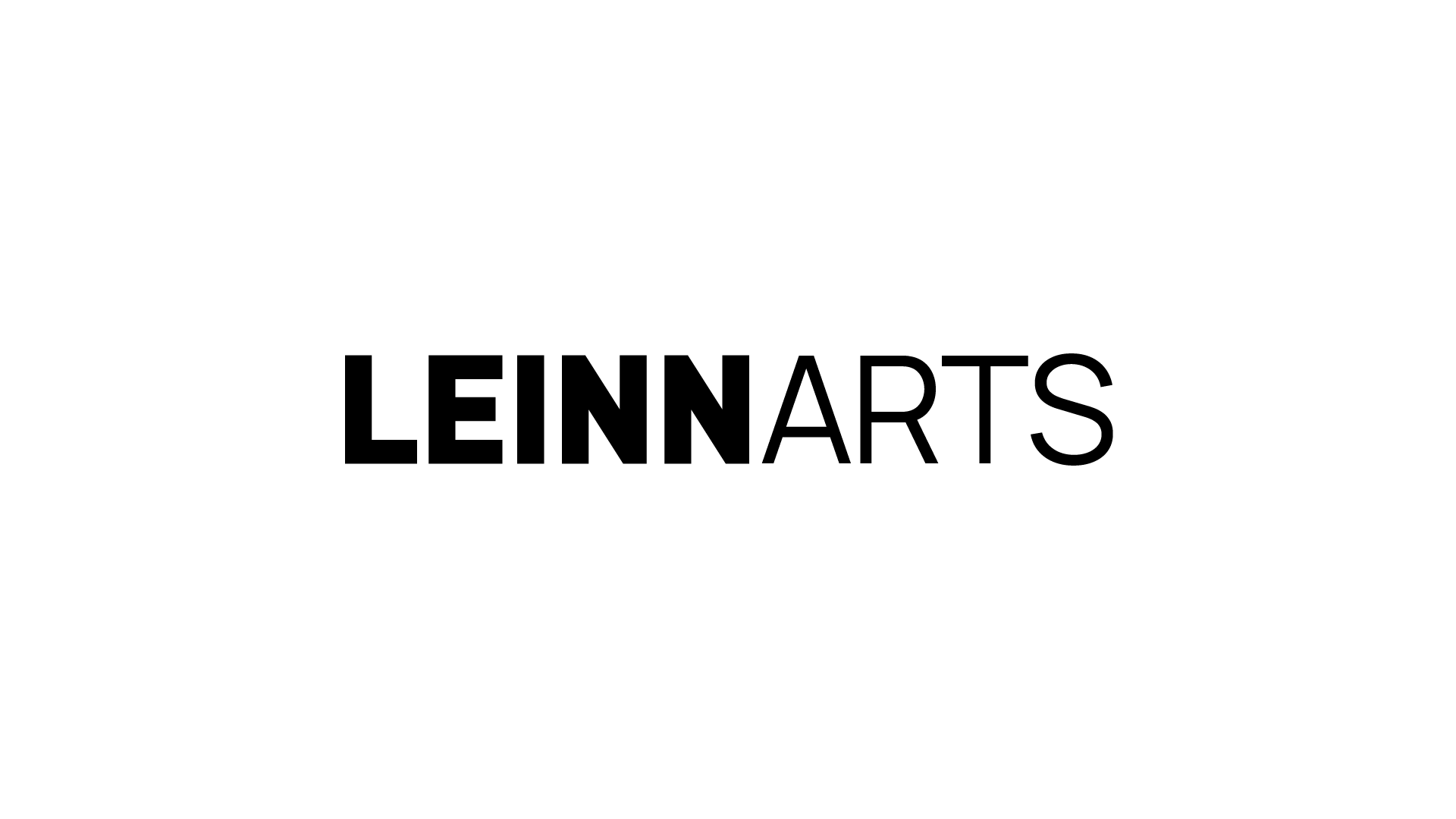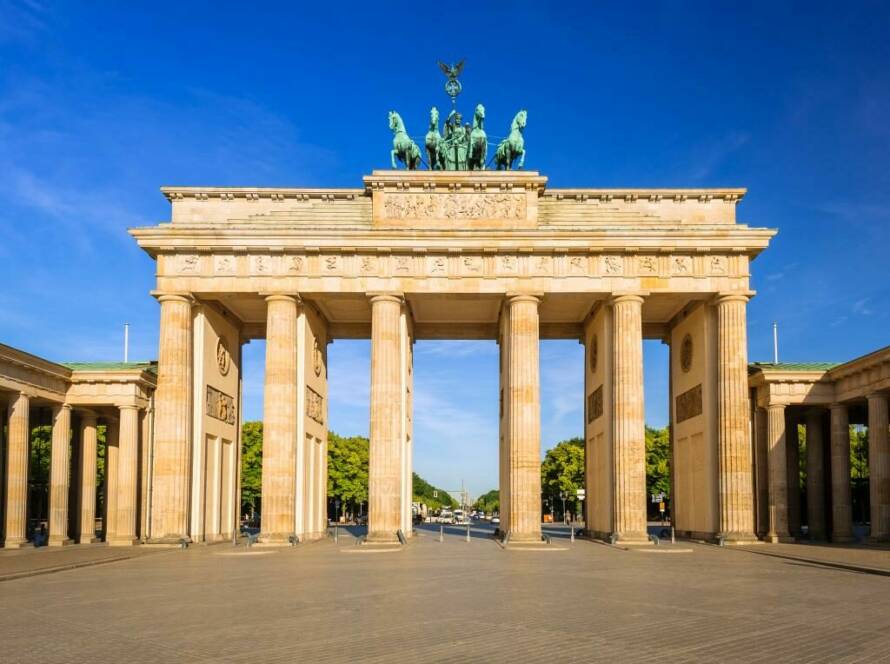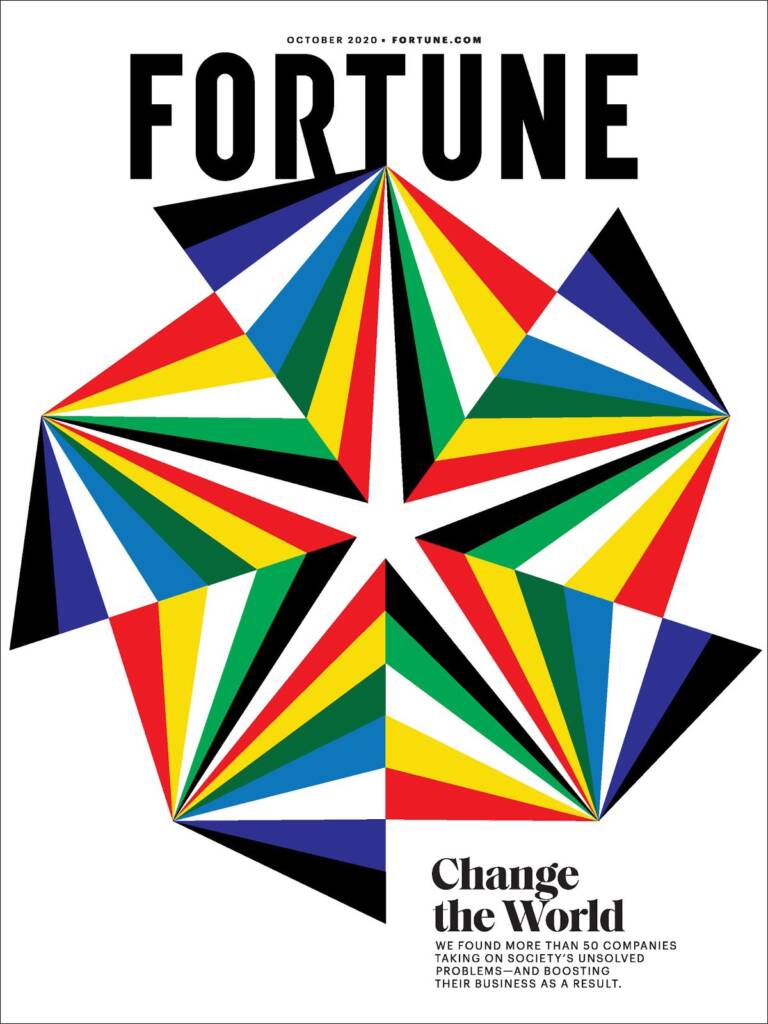
Mondragon has been awarded by Fortune Magazine as one of the Top companies that Change the World, together with companies such as Alibaba, Walmart, Zoom, and PayPal Mondragon is ranked 11th in the list of companies that are Changing the world during this challenging year 2020.
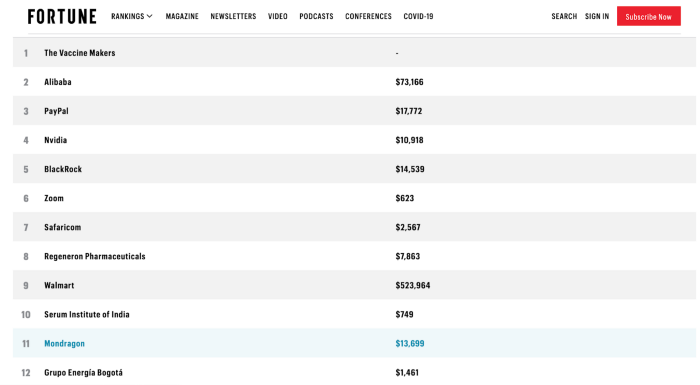
Each year, FORTUNE magazine looks at the notable impact of companies. The initial solicitation and assessment of nominees are conducted in partnership with the Shared Value Initiative, a global platform for organizations seeking business solutions to social challenges. A team of journalists from FORTUNE then investigates each of the candidates independently. The final list is selected and ranked by the editors of FORTUNE based on the magazine’s own reporting and analysis.
Fortune’s Change the World list is built on the premise that the profit motive can inspire companies to tackle society’s unmet needs. The 2020 list, our sixth, stresses a crucial corollary: No business succeeds alone. Collaboration among companies, even among rivals, is a common thread, from the effort to make “green” steel, to the campaign to close America’s racial wealth gap, and, above all, in the race for a COVID-19 vaccine. As we face unprecedented collective challenges — a global pandemic, climate change, profound income inequality cooperation has become a business superpower.
How Fortune choose the companies
The Change the World list recognizes companies that have had a positive social impact through activities that are part of their core business strategy. As we assess nominees, among the factors that matter most are:
1.Measurable social impact
We consider the reach, nature, and durability of the company’s impact on one or more specific societal problems.
2. Business results
We consider the benefit the socially impactful work brings to the company. Profitability and contribution to shareholder value outweigh benefits to the company’s reputation.
3. Degree of innovation
We consider how innovative the company’s effort is relative to that of others in its industry and whether other companies have followed its example or partnered with it.
4. Corporate Integration
We consider how integral the initiative is to a company’s overall strategy, and how well that strategy is communicated through the ranks and elsewhere.
How Mondragon is changing the world
MONDRAGON is the outcome of a cooperative business project launched in 1956. It is structured around four business areas: Finance, Industry, Distribution, and Knowledge.
With a broad international presence, in 2019 it achieved sales of over 11.6 billion euros and had a workforce of over 81,000 people. Its cooperatives have helped to combat the pandemic by starting up new businesses and approaching institutions and various associations, placing their technical and human resources at their service.
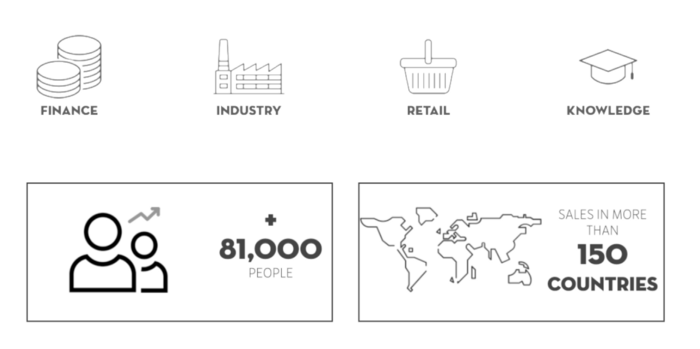
Mondragon is a conglomerate of 260 companies spanning construction, finance, education, manufacturing, and agricultural and food production. (One of its companies worked on the roof of the Guggenheim Bilbao, shown here.) With 12.2 billion euros ($14.5 billion) in revenue last year and more than 81,000 employees, it’s one of Spain’s largest employers — and as the world’s largest federation of worker-owned cooperatives, it has grown in part because it doesn’t disproportionately enrich top brass. No top executive makes more than six times the salary of the lowest-paid worker in his or her cooperative (and all earn far less than $1 million annually). “They know they have to be profitable or they won’t exist. This is not a hippie group of co-ops,” says Georgia Kelly, founder of the nonprofit Praxis Peace Institute, who leads seminars at Mondragon. “But their ethic is people before profit.”
Mondragon is cooperation humans who join their efforts to make a better, different, inclusive, responsible, equitable and caring future. Sustainable, socially, economically and environmentally. Mondragon is articulated around four business areas: finance, industry, distribution and knowledge. It is a cooperative identity reality, which seeks to care for its people, competes in the global market and pursues common progress.
Humanity at work
“We are all responsible for everything”
Response- / -Ability (the ability to respond)
Individual responsibility
■ In the cooperative, we are all responsible for everything.
■ Participation and integration in the collective tasks is a sign of maturity.
■ A healthy society is one in which everyone lives according to their own merits and it becomes more and more difficult to live off others.
Education
■ The redistribution of resources is important, but the socialisation of culture is even more so. Education and training are much more profitable than the balance of advances and returns.
■ In order to democratize power, we must socialize knowledge.
Facts
■ The theory which is not put into practice, convictions which are not put into action, are as abnormal as the life which does not beat or movement which does not vibrate. We are not put on this earth to watch or complain, but to transform.
■ «Good ideas» in people who are not able to put them into practice can be a dangerous drug. Good ideas are the ones that become realities.
Adaptation
■ Adapt or die. The sign of vitality is not to last forever but to be reborn and adapt, evolve, and try to allow for the future. Research is essential for this to be possible.
Union
■ The societies that triumph are those that best adapt and know-how to accelerate their action processes by joining forces to build.
■ Partnership is the strength of the weak.Solidarity is the powerful lever which boosts our strength.
Management
■Circumstances are neither good nor bad, they are simply a reality with which we have to work.
■ We cooperatives must be noted for our capacity for commitment, for the degree of foresight, planning, order, and projection that we are able to apply in our management.
■ The company cannot and should not lose any of its virtues of efficiency due to the fact that human values prevail over purely financial or material resources, before that happens it must increase its efficiency and quality.
“What is a human being? An imperfect being. A perfective being. A being whose destiny is not to contemplate but to transform. To transform oneself, To transform all around us.”
Mondragon response in COVID
Mondragon Assembly Kunshan, a subsidiary of Mondragon Assembly in China, is working on the design and manufacture of the four machines that are scheduled to leave China in mid-April. One of the machines will go to the Central Government and the other three to Bexen Medical to begin as soon as possible with the production of surgical masks. Spanish cooperatives Mondragon Assembly and Bexen Medical to produce 10 million masks for the medical sector.
This project is a challenge for the people who participate in it, due to the urgency, the short time for its execution (4 weeks), and the health emergency situation that has complicated the coordination of the design, manufacture, logistics, and commissioning of the machines.
Eroski has established priority entrance to healthcare workers, seniors, pregnant women, and people with disabilities, as well as organized an area dedicated to transporters to allow them to take a shower and disinfect their hands (info here & here)
Mondragon corporation in China
The 1st step Mondragon made in China was in 1992 when the first Mondragon cooperatives came to China for the first time.
The next important step is the consolidation of Mondragon Corporation Cooperative in China opening the first Industrial Park at Kunshan back in 2006. The MONDRAGON Corporation has ratified its commitment to China through the recent launch of a new project by Danobatgroup and the celebration of the tenth anniversary of the Fagor Arrasate plant. The MONDRAGON network in China involves 22 manufacturing plants, 24 commercial offices, a turnover of more than 300 million euros, and almost 1,800 employees.
Mondragon Team Academy

Mondragon Team Academy, part of the business faculty of MONDRAGON UNIVERSITY who leads the knowledge division of MCC, is a global network, laboratories of social innovation ecosystems focused on team entrepreneurship. MTA was created in May 2008 by a team from Mondragon University in collaboration with TiimiAkatemia in Finland.
Today, MTA has developed a vibrant international community made up of more than 2500 team entrepreneurs, who have created more than 80 team companies, in 15 laboratories operating on 4 continents: Europe (Spain, Germany), Asia (China, Korea, India, Singapore, Japan), America (Mexico, US, Colombia) and Africa (Kenya).
MTA World and TU adheres to the MONDRAGON cooperative vision, the world’s largest cooperative group, to create a radically innovative education and experimentation system starting from undergraduate and graduate programs. MTA provides an ecosystem for the creation of people-centered companies that generate economic and social impact based on the principles of “team companies” and “learning by creating”.
In 2014, MTA China was created to enable this innovative education serving Chinese educators, learners, and parents. “We believe that the Soft Skills are the New Hard Skills” and we design programs to develop: Team-entrepreneurial skills, Leadership skills, and Change-making skills.
MTA’s LEINN, LEINN International, TEAMINN, MINN we visit Mondragon HQ located in Kunshan every year so we have the chance to experience the active cooperative values with all the participants of our programs.
